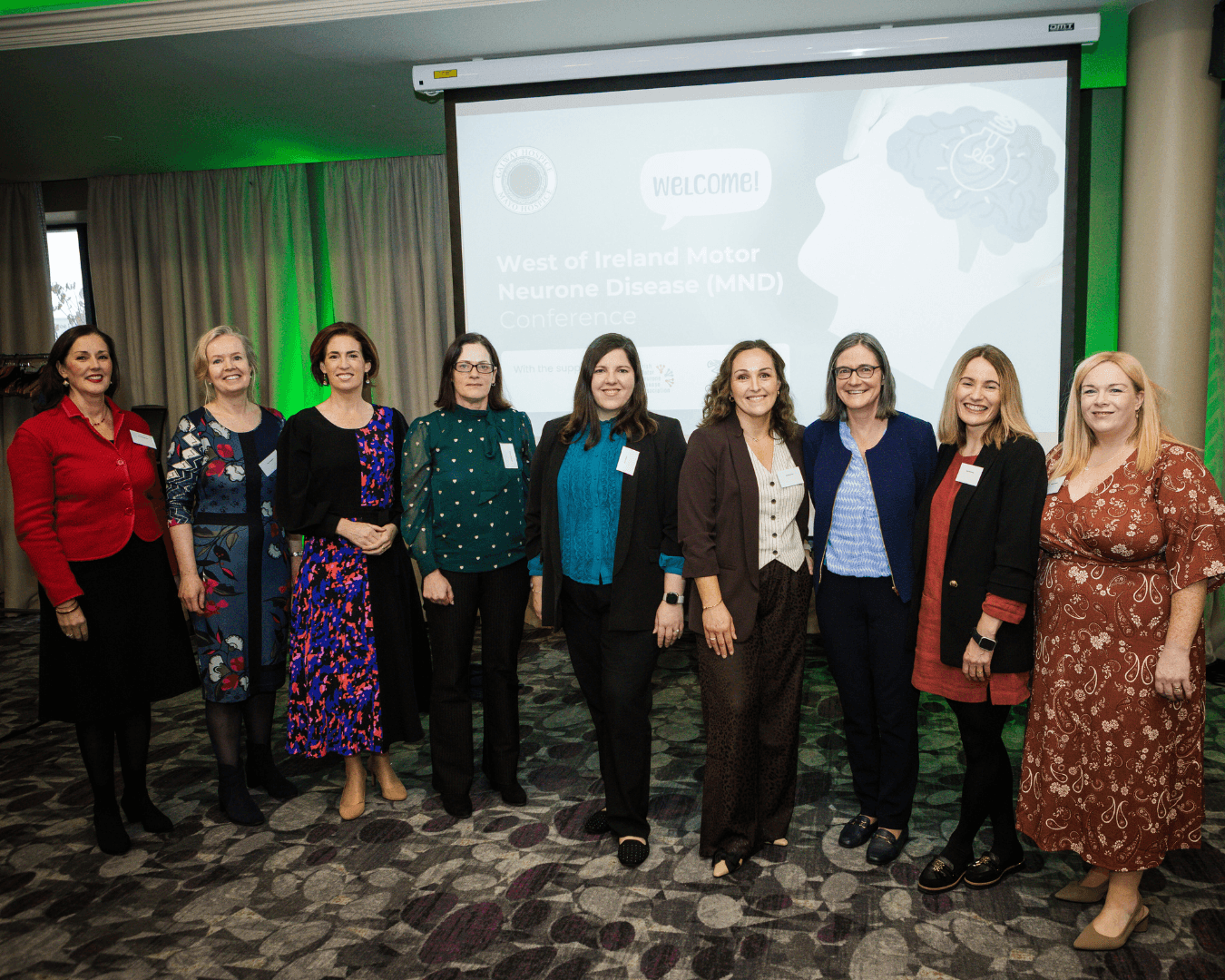
Healthcare professionals from across Ireland gathered yesterday at the Athlone Springs Hotel for the West of Ireland MND Conference, a major interdisciplinary event focused on improving care for people living with Motor Neurone Disease (MND).
Organised by Galway Hospice Foundation in collaboration with the All Ireland Institute of Hospice and Palliative Care (AIIHPC) and the Irish Motor Neurone Disease Association (IMNDA), the conference addressed the needs of over 470 people currently living with MND in Ireland, with approximately 150 new diagnoses each year.
Motor Neurone Disease is a progressive neurological condition that affects voluntary muscle control, impacting walking, talking, swallowing, breathing, and independence. The conference recognised both the courage and resilience of people living with MND and the critical importance of advancing care and support through innovation and collaboration.
Hildegarde Naughton, Minister of State with Responsibility for Disability, delivered the opening address, emphasising a crucial shift in care approach: “The intersection of palliative care and MND should begin at diagnosis, not just at end of life. As you all know, it improves symptom control, emotional wellbeing, and quality of life for the patient, and enables patients and their families to plan ahead and maintain their dignity.”
The conference reflects Galway Hospice’s growing commitment to MND care, with patient numbers rising significantly from 14 in 2021 to 35 in 2024 as referrals to palliative care services continue to increase.
Donna Lynott, Event Chair and Assistant Director of Nursing at Galway and Mayo Hospices, explained: “This event was designed in response to needs identified by staff at Galway and Mayo hospices for more information and up-to-date education on caring for patients with Motor Neurone Disease. The past number of years in particular have seen an increase in the number of patients being referred to palliative care services with an MND diagnosis.”
A key theme throughout the day was the role of innovation in enhancing independence and comfort for people living with MND. Presentations highlighted new technologies including communication aids, voice banking, and virtual reality assistive devices that are transforming care possibilities.
The conference showcased the essential nature of multidisciplinary teamwork, bringing together expertise from neurologists, nurses, therapists, dietitians, respiratory specialists, and palliative care professionals. This collaborative approach ensures comprehensive, person-centred care that addresses the complex needs of MND patients and their families.
Professor Orla Hardiman, Consultant Neurologist, highlighted a critical challenge: “Cognitive or behavioural symptoms are frequently not recognised or appreciated by families, and may be missed by referring services.” This underscores the importance of interdisciplinary collaboration in early detection and comprehensive care.
Kevin Burn, CEO at IMNDA, emphasised the conference’s collaborative purpose: “What’s really important today is health professionals all getting together and making sure that the care provided for those suffering from MND and their families is as good as possible, and that people get the best standard of living when they have MND—all over Ireland, as soon as possible.”
The full-day programme featured presentations from leading specialists across multiple disciplines. Attendees heard from Ms. Naomi Fitzgibbon, Director of Nursing at IMNDA, on “IMNDA: 40 Years of Support for Those Living with MND”; Mary Rabbitte, Programme Manager for Research at AIIHPC, on the psychosocial impact of MND and approaches to care; and Professor Orla Hardiman on clinical and palliative aspects of the condition.
Ms. Ciara Amory, Clinical Speech and Language Therapist in MND at Beaumont Hospital, presented on communication and assistive technologies, while Fidelma Rutledge, IMNDA Clinical Nurse Specialist, and Miriam Morris, Clinical Nurse Manager at Mayo Hospice Day Care, shared insights on collaborative care approaches.
The programme also included practical workshops led by Moira Murphy on respiratory management and equipment considerations, Ann McSorley on nutrition support, and Dr. Ita Harnett, Palliative Medicine Consultant, on advance care planning. Kathy Hyland, Art Therapist at Galway Hospice, also contributed to the day’s sessions.
A particularly important aspect of the conference was the inclusion of patient and carer voices. Attendees heard a pre-recorded patient story segment, ensuring the lived experience of MND remained central to discussions.
Mary Rabbitte of AIIHPC said: “This conference brings together those who care for people with Motor Neurone Disease and their families across the West and Midlands of Ireland. It’s an opportunity to share our experiences, learn from each other, and improve the quality of life for people living with Motor Neurone Disease and their families through palliative care in our communities.”
The organisers expressed gratitude to all speakers, contributors, and attendees for their dedication and expertise demonstrated throughout the day. The conference represented not only an opportunity for professional development but also a commitment to continued dialogue, learning, and advocacy in MND care.
Donna Lynott concluded: “In collaboration with IMNDA and AIIHPC, the day is designed to not only provide up-to-date evidence-based knowledge, but also to demonstrate how palliative care and IMNDA services can work together in the community, acute or hospice settings, creating increased awareness of the needs, goals and wishes of patients while enhancing communication and shared care across services.”
The event reinforced a shared commitment among healthcare professionals: that every person living with MND should be met with compassion, expertise, and hope.
“As we begin our Tree of Lights Ceremony, we light this lantern. It is a beacon of light and hope…
Galway Hospice Foundation has reduced its carbon emissions by 53 tonnes through a series of energy efficiency and sustainability initiatives…
A tribute from Galway Hospice. This week, the Galway Hospice team learned with great sadness of the death of our…